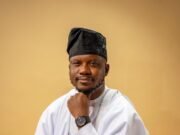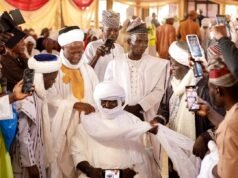Historically, outcomes of Election Petitions Tribunal sittings have in no small way helped to deepen the country’s electoral system. I am therefore, convinced that like it happened previously, Osun’s case will be a litmus test for every critical stakeholder as we prepare for the 2023 general elections.
The revelations that will be coming from the Tribunal will no doubt be stunning, especially because since the introduction of the BVAS (Bimodal Voters Accreditation System) by the Independent National Electoral Commission, INEC, Osun will be the first place where the BVAS report is being subjected to critical analysis.
INEC as an institution would have done its best to ensure a seamless process. However, since those saddled with the responsibility of operating the technology are not angels, there are bound to be rooms for improvement.
In essence, the decision by Governor Adegboyega Oyetola to challenge the outcome of the July 16 Osun Governorship poll should never be seen as an attempt to impugn on the integrity of INEC. Far from it.
Rather, Oyetola should be commended, for taking to the path of civility and the rule of law; for helping to deepen the country’s democratic values and the electoral system.
I, therefore, make bold to say that the outcome of the Osun Election Petitions Tribunal will go a long way in making INEC fill some gaps that might have been noticed ahead of the 2023 General Elections, just as the National Assembly would also be guided appropriately when proposing further amendments to the Electoral Act in the future. This is even more so because most of the reforms we have today as part of our electoral laws were borne out of the decisions of the court.
The revelations and subsequent decision of the Tribunal and those of the other two courts that would follow may as well be part of the future reforms.
What are the issues before the Tribunal? Fundamentally, the All Progressives Congress, APC, and its candidate in that election, Oyetola, are challenging the eligibility of Senator Nurudeen Jackson Ademola Adeleke to stand for the election in the first instance. Additionally, they are contesting the fact that contrary to INEC’s declaration, the Peoples Democratic Party, PDP, and its candidate in that election, Adeleke, did not score the lawful majority votes to be so declared as the winner of the July 16 governorship election.
What are the facts of the issues raised?
Recall that it is common knowledge that, in 2019, Senator Adeleke, who was declared eventual winner by INEC, faced criminal allegations of examination malpractice.
He was arrested and brought before the court. He was granted bail, and then he travelled abroad. He however did not show up again until he returned barely a year to the July election.
Interestingly, when he was running in 2018, he claimed to have registered for GCE O’ Level in 1981 but had F9 in English Language and was recorded absent for other subjects.
Ironically, his profile on the website of National Assembly at the time, also indicated that he is a holder of a Diploma Certificate in Criminology from Jacksonville State University (JSU), where he purportedly graduated from in 1986.
However, in an investigation carried out by the International Centre for Investigative Reporting, ICIR, at the time, the above claim was faulted by Buffy Lockette, the Director of Public Relations at the university.
The fact check done by ICIR further revealed that while it was true that Senator Adeleke had indeed enrolled at the institution, he was never awarded any certificate.
A further inquiry from the West African Examination Council’s website at the time to verify Senator Adeleke’s O’ level result being paraded then, using examination number 19645/149 came back as “result not available for this candidate in the specified year and exams diet.” So, as at 2018, he had no O-level results.
But upon his return, he claimed he has a diploma, awarded to him mid last year, and that the said certificate qualified him for a B.Sc. in Criminal Justice, from the Atlanta Metropolitan State College in the United States.
Interestingly, he claimed to have obtained the degree barely 24 days after getting the said Diploma certificate.
Apart from challenging his eligibility, which is both a pre and post election issue, the APC and its candidate are also challenging the election results in 749 polling units across 10 Local Governments.
Again, recall that after the election, the APC and its candidate applied for the BVAS report. For the purpose of education, Sections 47(2) of the Electoral Act says that to vote, the presiding officer shall use the smart card reader or any other technological device that maybe prescribed by the Commission for the accreditation of voters to “verify, authenticate the intending voter in the manner prescribed by the Commission.”
And for the purpose of Osun election, INEC had prescribed the BVAS as the only credible means of accreditation.
But the Certified True Copy, CTC, of the report of BVAS across 10 Local Governments in 749 polling units showed that accreditation through BVAS was less than the number of votes cast in those units.
However, once APC and its candidate filed their petitions in court, INEC later issued another CTC of the BVAS report to the PDP, claiming that as at the time the first one was issued, it had not syncronised the data in the BVAS.
The question will now be, what was the basis of declaring the election results? Is INEC right to have issued two BVAS reports that do not align? These and many more are some of the issues the Tribunal will be helping Nigerians to resolve in the days ahead, as it begins daily sittings tomorrow.
Berating INEC for the seemingly confusion, the Human and Environmental Development Agenda, HEDA, said the report had raised grave concern over the seeming difference in the copies given to the APC and the PDP.
It further said : “INEC is alleged to, having discovered the palpable inconsistencies between figures recorded as accredited votes on the EC8A (result sheet) and the BVAS Report, tampered with the contents of the original BVAS report to protect the mandate awarded to Ademola Adeleke and PDP, at the expense of credible election, by issuing a fresh CTC to the defendants, claiming the CTC earlier issued to APC and Oyetola was incomplete and unsynchronised.”
“Considering that the Ekiti and Osun elections were conducted and declared on the basis of BVAS, how possible and plausible is it for INEC to have declared a winner from an unsynchronized BVAS? Considering the BVAS report was issued more than 10 days after the Osun election.
“As an Organisation committed to fighting against corruption, financial and electoral …, HEDA is concerned about this development. The Organisation observed the Osun election and engaged the process in collaboration with anti-corruption agencies to campaign against vote buying.”
One thing is clear: there are interesting days ahead. The two walks embarked upon by the APC recently to drum support for its presidential candidate and his running mate, Asiwaju Bola Ahmed Tinubu and Kashim Shettima, in Osun, are a pointer to one clear signal: APC is still very popular in Osun. It remains the party to beat.
Therefore, let all the supporters of Governor Oyetola remain calm, and resist the temptation to precipitate crisis by members of the opposition PDP. Like Oyetola said prophetically during one of the walks on the streets of Osogbo, where he trecked for over two hours, spanning about 11Km, and reiterated last Thursday when he and his Oyo counterpart flagged off the reconstruction of the 91km Osogbo-Iwo-Ibadan road, “Oyetola will reclaim his mandate”.
Omipidan, a former Political Editor with The Sun Newspapers is the spokesperson to Osun Governor.

































